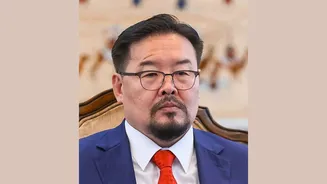The Constitutional Court said a motion passed by the State Great Khural or parliament last Friday (Oct 17) to dismiss Prime Minister Zandanshatar Gombojav had no legal basis, the official Montsame news agency reported on Thursday (Oct 23).
The court sided with President Khurelsukh Ukhnaa, who on Monday (Oct 20) vetoed the parliament's resolution to dismiss Zandanshatar, citing procedural irregularities, including the use of an "incorrect voting formula."
Zandanshatar, nominated by President Khurelsukh and named as prime minister in June, is expected to be able to fend off reformists within the Mongolian People's Party led by former parliamentary speaker Amarbayasgalan Dashzegve, said Xu Tianchen, a senior analyst at the Economist Intelligence Unit.
Zandanshatar is seeking to push through a more conservative economic policy ahead of the next election in 2027, resisting calls for stronger anti-corruption measures and progressive taxation.
Read more: PM Modi unlikely to attend ASEAN Summit, ruling out meeting with Trump on sidelines
But the confrontation could lead to an economically damaging policy stalemate, analysts say, worsening a cost-of-living crisis and delaying efforts to diversify the economy beyond mining, as government instability hampers long-term planning and deters foreign investment.
The Mongolian People's Party also faces pressure to address public discontent over allegations that government officials misappropriated state funds and were engaged in corruption.
Those concerns sparked large-scale street protests in urban centers, including the capital Ulaanbaatar, which ultimately prompted parliament to vote to remove Prime Minister L. Oyun-Erdene four months ago.
"I'm afraid that the turbulence will last until 2027, as the factional conflict within the Mongolian People's Party continues," said Xu.
"President Khurelsukh has tried to defend his people, but his influence will diminish as he approaches the end of his presidency," he added. "Amarbayasgalan and his fellows will try hard to dominate the political landscape."
COAL-POWERED POLITICS
Parliament moved to dismiss Zandanshatar after his government proposed changing the mining royalty calculation from international benchmark prices to lower domestic prices for key materials, particularly coal.
The plan would reduce government revenue but increase profits for domestic and foreign mining companies, limiting the state's ability to finance social welfare initiatives and infrastructure.
Mongolia exported a record 80 million tons of coal, worth $8.6 billion, in 2024, customs data show, cementing the commodity as the country's top export. About 90% went to China.
In September, the International Monetary Fund said unpredictable Chinese coal demand - owing to a slowing economy and Beijing's efforts to curb coal overcapacity - and falling coal prices were weighing on Mongolia's growth prospects, urging officials to push through structural reforms.
Read more: US announces sanctions on Russia's two biggest oil producers in bid for Ukraine talks
Eric Olander, co-founder of the China-Global South Project, said China was unlikely to be fazed by the politics across its northern border, as long as the eventual winner remains favourable to Beijing and can ensure mineral supplies.
That said, the growing number of countries around China where young people have taken to the streets to protest the erosion of the social contract between government and society could start to raise concerns, Olander added.
"They don't want yet another country along its periphery to become a variable," Olander said, citing the 'Gen-Z' uprisings in Indonesia, the Philippines and Nepal, as well as instability along China's borders with Myanmar and India.
"Young people in many countries feel they are getting screwed by their governments, a sort of populist backlash. We haven't seen that yet in either Vietnam or China, where the social contracts are generally much stronger, but they are definitely not immune."
















